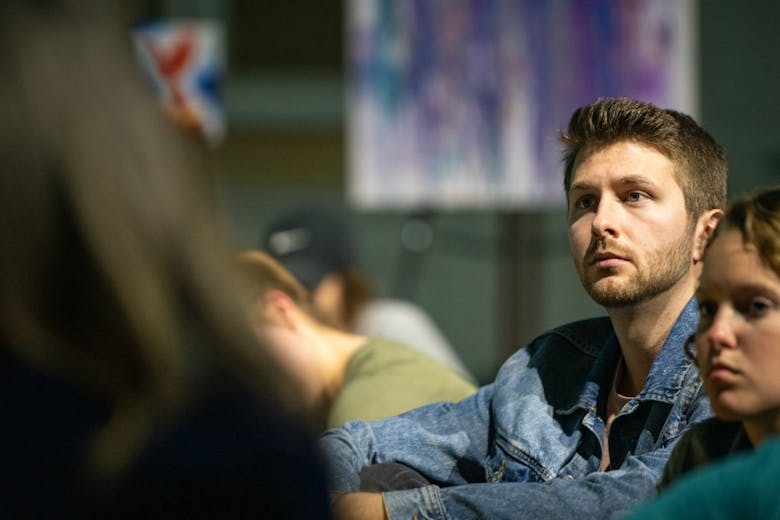“I’m standing here tonight because I believe in me, I believe in you and I believe in us,” Claudia Cisneros said.
Hundreds of Ohio University students and Athens residents gathered in Baker Center Ballroom on Thursday night to hear the stories of sexual assault survivors and advocate for one another. Tears were shed and hugs were given throughout the night.
Cisneros said in her speech that when she used to dream about being in a parallel world, she would not have been assaulted. Now, she realizes if that were the case, she would not have a chance to be in a movement such as #MeToo and meet exceptional people.
“I would be oblivious to this crucial part in history, and if I’m standing tonight before you, with you, it is because yes, I have suffered pain, but I believe in our power to turn that experience around,” Cisneros said.

Cody Shanklin, Ohio University senior and psychology major, listens to a speaker during the Take Back the Night event in the Baker Center ballroom on Thursday, April 4, 2019.
Brooks Funke also shared his story of being sexually assaulted and his battle with drugs as a result. He said confronting his past was hard, but friends and advocates helped him learn that he was worth it.
“Before I could take back the night out here, I had to take back my night,” Funke said.
After the speeches and performances from sexual assault survivors and advocates, the crowd marched down the center of Athens. People shouted chants like “One, two, three, four, we won’t take it anymore. Five, six, seven, eight, no more violence, no more rape,” and “Whose streets? Our streets,” while marching up Court Street.
Ellie Hamrick, an Athens resident, said her socialist political views led her to go to the march to support women and raise awareness against assault.
“I’m really, really, really sick of a world where women and other non-men are treated like property,” Hamrick said.
During the march, Hamrick carried a sign that read, “When women aren’t free, no one’s free.”
“I think it’s really important that we be there to support each other emotionally and come together as a community,“ Hamrick said. “I also think it’s important to look at who has power in this situation, and who benefits from the status quo, and that we organize to fight against those forces.”
Many other people were carrying similar signs that read things such as, “Assault should not be your college experience,” and “Survivors deserve to be believed here.” Marchers were also carrying flameless candles.
Tori Bell, a sophomore studying communication sciences and disorders and entrepreneurship, was not able to go to the march last year but made sure to go this year to show solidarity.
“I just thought that it would be nice to support and learn from others and find other ways to support others on campus,” Bell said.
Marches are ways to give people a place to voice their opinions, Bell said.
“It gives everyone a voice in a place where it stops everything and makes sure everyone is heard,” Bell said. “When you’re in the street like this, everyone is going to stop and look at you.”
Kimberly Castor, the director of the Survivor Advocacy Program at OU, highlighted in her speech that every person marching mattered.
“Your presence here tonight matters,” Castor said. “It matter to the people watching our their dorm room windows, to the perpetrators who got away with it, and it matters to the many victims who see you marching but aren’t yet ready to march themselves.”






